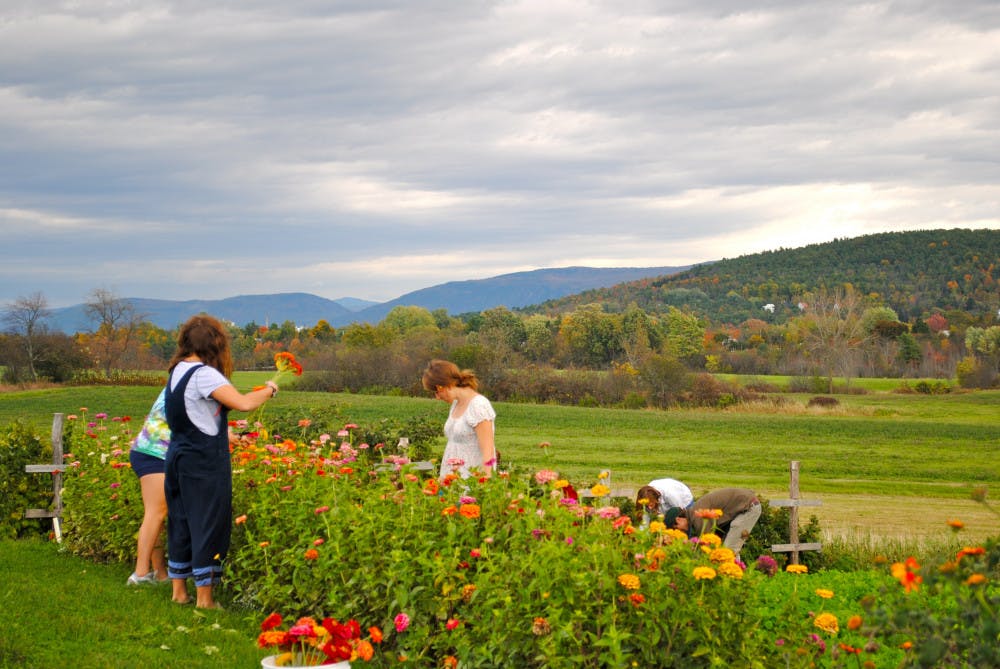Throughout the spring semester, the Middlebury College Organic Farm (MCOF) will be making several changes to its current operations, including the introduction of chickens for eggs and meat, the allocation of plots of land to different student organizations and the incorporation of new seeds and farming techniques.
Perhaps the most notable addition to the farm is the chickens. Senior Co-Director of the Organic Farm Katie Michels ’15 said that this spring the farm plans to introduce 12 egg-laying birds as well as 40 chickens that will be raised for later consumption.
With the exception of honeybees in the past, MCOF does not keep any animals. The introduction of the chickens will mark the beginning of the farm’s animal product and by-product operations.
The farm received permission to bring the chickens to campus from the College’s Facilities and Services Office this spring, and three weeks ago they received an Environmental Council Grant to sponsor the project.
Michels said, “[The addition of the chickens] is mostly inspired by the idea that you can’t just produce vegetables. We need animals to eat vegetable waste and to fertilize the vegetables, so they’ll complete the cycle of the farm.”
In terms of other additions to the farm, the MCOF organizers have a project underway to introduce cultural gardens, new plots for student organizations on campus. The farm has been a frequent supplier to the College’s dining services over the years, selling bulk orders of products such as chard, basil and squash.
Michels expressed hopes that these changes will allow for the creation of a new educational space on campus for students interested in food and farm studies.
“We could just keep selling to Dining [Services],” said Michels, “But I think we have more potential as an educational space, and as a place to grow food for a school that’s really interested in food.”
In order to follow through with this mission, the farm plans to allocate plots of land — cultural gardens — to various student groups who show an interest. According to Michels, Hillel has already reserved a plot.
The farm’s staff would care for the gardens over the summer, and then in the fall, the farm will throw a cultural harvest festival where student organizations can cook from their garden “in hopes to create an outdoor community space to share food and conversation,” according to Food and Farm Educator Sophie Esser Calvi.
This project builds upon the farm’s outstanding partnership with Weybridge House, which has sourced its food from the farm since last summer. Farm organizers are also attempting to cement their relationship with Dolci, the College’s student-run restaurant.
Michels stressed the importance of the farm to Dining Service’s access to locally grown foods.
“We’re starting to grow nice lettuces, herbs and other specific things that Dolci uses frequently, so they can get it from us rather than from far away,” said Michels of the farm’s plans for the spring semester.
Not only is the farm expanding its presence on campus this spring, but the farm is also experimenting with new seed varieties and planting techniques. They have recently received a large seed donation from Renees Garden company, a seed distributor located in California.
“The farm is a place where we do what the students want to learn,” said Esser Calvi. “For instance, we will practice different growing methods. We are also growing different varieties of produce this year such as four different types of radish, beets etc. We’ll be doing trials and basically testing [the different] varieties.”
Farm volunteers will be working with many plants that are not typically grown in Vermont climates. According to Senior Co-Director Ari Lattanzi ’13, the farm organizers have hopes of finding a crop that can be grown in this climate with few losses. The directors of MCOF could then share these findings and advise other farmers in the area who do not have the ability to take risks with crop experimentation due to financial instability.
“We’re talking about trying several different techniques, maybe biodynamic farming, [which] is planting with the seasons and the cycles of the moon,” said Lattanzi of the new farming techniques. “[Another technique] is permaculture, a type of low-input farming that involves less interference in the lifecycles of the plants once they are established.”
“The farm will grow because there’s this new energy for a food and agriculture studies program, and there’s more land that we could expand into,” added Lattanzi. “We’re making sure the farm has something for everyone.”
Organic Farm Expands Services

Comments



